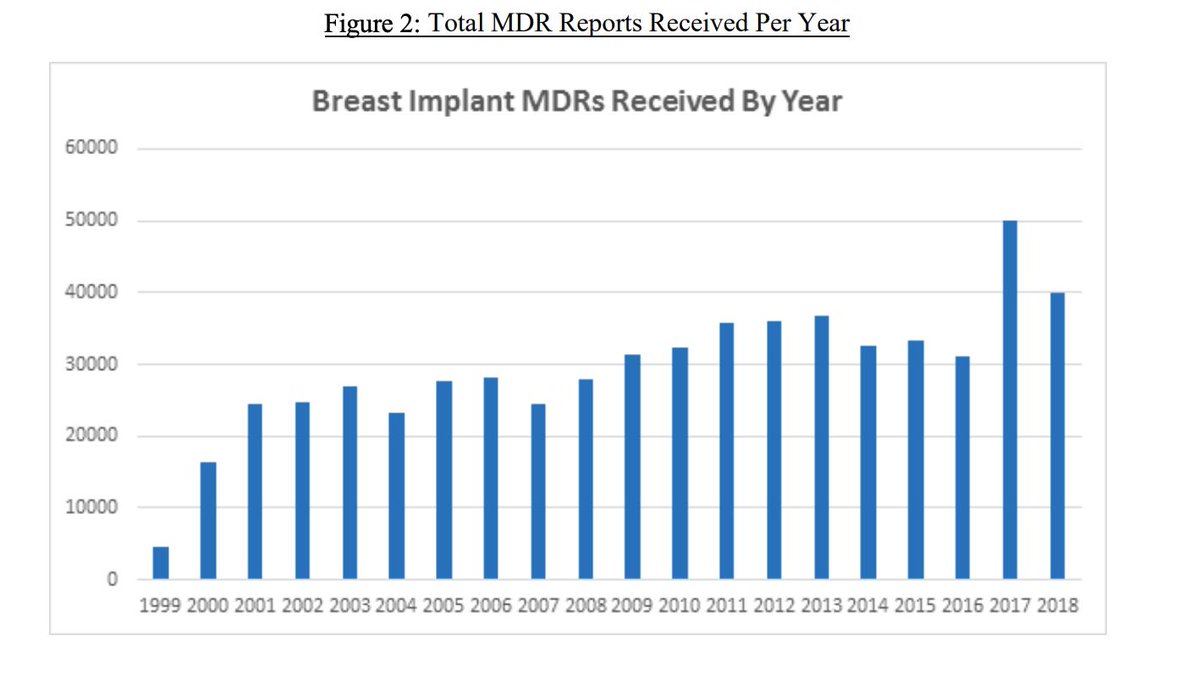Today’s FDA hearing on breast implant safety is underway. I’ll be covering it live for @ICIJorg 

Today's hearing will address the rare cancer BIA ALCL that is associated with breast implants, as well as the autoimmune/inflammatory symptoms known as breast implant illness. Regulators, doctors, patients and industry will all testify.
Dr. Binita Ashar, director of Surgical Devices at FDA's device division, kicks off. She notes backdrop of recent actions on BI safety by FDA, European Union and Canada. On BIA ALCL, says % of ALCL among smooth vs textured implant patients unknown, so both groups should be advised
Before going into the testimony, there is an eye-popping chart from the FDA's meeting materials. It shows hundreds of thousands of medical device reports on breast implants in recent years. These numbers are tens to hundreds of times higher than those previously made public. 

It's not clear to me what explains this - whether these reports were previously hidden in summary reports, whether they are mostly harmless malfunctions, or even if its a typo. But the numbers are staggering, and I will try to get answers from the FDA
Representatives from European Union and Canada describe the steps they are taking. EU has task force examining ALCL, Health Canada says it is investigating breast implant illness and consider creating a national breast implant registry.
In significant news from the EU, our partner @stephanehorel says today that French health authorities are considering banning 7 brands of textured implants and have requested comment from industry
https://twitter.com/stephanehorel/status/1110085127915401216
“My doctors told me I was a tired mom and I was getting older, but I was 24” - @Jamee_cook of @BIVA_news describes having fatigue, brain fog and other debilitating symptoms after her implants dismissed by her doctors
Women who report being harmed by breast implants stand during @Jamee_cook's testimony 

Cook says BIA-ALCL should be considered "emerging" rather "rare" disease, and calls on the FDA to ban or declare a moratorium on textured implants and hold manufacturers accountable. “if you don’t hold them accountable, who will?” she says
For those new to the subject of textured implants and BIA ALCL - or still struggling to wrap your minds around the details - we wrote this explainer to provide straight facts on the key questions
icij.org/investigations…
icij.org/investigations…
Industry representatives are now presenting. Very interesting stat from Allergan: in the US, 90% of its implants are smooth and 10% are textured. Outside the US, those rates are reversed and 90% are textured and 10% are smooth. #ImplantFiles
Raina Dauria, Mentor VP of regulatory affairs, addresses FDA warning letter to Mentor for failing to enroll enough patients in post-market approval study. She says MemoryShape, the implant being studied, is textured & textured implants are so rare in US its hard to find subjects
JoAnn Kuhne, Sientra VP of regulatory affairs, speaks on FDA warning letter sent to Sientra for low followup in its post-approval study. She says patients dropped out bc of "challenges of everyday life" like childcare & because they weren't ill. Says Sientra is working on it.
The FDA's Karen Nast presents data on medical device reports on BIA ALCL. Says there are 660 reports of BIA ALCL which, when duplicates are removed, reflect 457 cases. Those cases include 9 patients who died.
She also provided data on breast implant illness, based on symptoms listed on Healing Breast Implant Illness website, healingbreastimplantillness.com. FDA recorded 1311 reports of these symptoms, with fatigue, brain fog and rash most common. They include 4 patient deaths.
Interesting discussion of scientific data on breast implant illness. FDA says premarket studies aren't geared to examine it & post-market studies are limited by low followup. Bottom line: they don't have enough information #ImplantFiles
“I along with multitudes of other women feel duped,” testifies Nicole Daruda, founder of 70k strong Facebook group for women w breast implant illness. Here's our #ImplantFiles video by @shirafu on the story of one woman in her group
“Real world experience shows that doctors aren’t ordering and patients aren’t getting routine MRIs”- Dr. Mary Gingrass, plastic surgeon and member of surgeons group Aesthetic Society, says FDA recs for testing for ruptures are impractical and suggests using ultrasound instead 

Several plastic surgeons testified as well that the vast majority of their patients were happy with their implants. Watch Dr. Claire Duggal - who uses all types of implants & got implants herself - describe her patients' experiences
https://twitter.com/ICIJorg/status/1110225305803935744
US National Breast Implant Registry go live on July 1 and start sending data to manufacturers, says Dr. Andrea Pusic. It will allow plastic surgeons to conduct mandatory implant tracking and will coordinate with other registries worldwide, she says.
Recent studies show Allergan Biocell implants have 7.1 to 8.3 times greater risk of ALCL than other brands, testifies @clemensmd. Here's the detailed investigation of Biocell implants by our Canadian #ImplantFiles partners @thecribby & @jesse_mclean
thestar.com/news/investiga…
thestar.com/news/investiga…
“Implants are not inert. They react with the immune system,” testifies Dr. Jan Cohen Tervaert. Discusses his recent study of 100k+ patients in Israel finding patients w breast implants 45 percent more likely to have autoimmune disease than those w/out them
ncbi.nlm.nih.gov/pubmed/30329056
ncbi.nlm.nih.gov/pubmed/30329056
Diana Zuckerman, longtime patient advocate, says informed consent for breast implants must include: 1) warning that family & genetic history can increase risk, 2) warning of breast implant illness and 3) notice that explant can improve patient health
icij.org/blog/2018/12/i…
icij.org/blog/2018/12/i…
“Half our members are seeing breast implant illness patients,” says Dr. Mindy Hawes, plastic surgeon and member of the plastic surgeons' group Aesthetic Society. “We need to educate our members.” #ImplantFiles 

• • •
Missing some Tweet in this thread? You can try to
force a refresh






